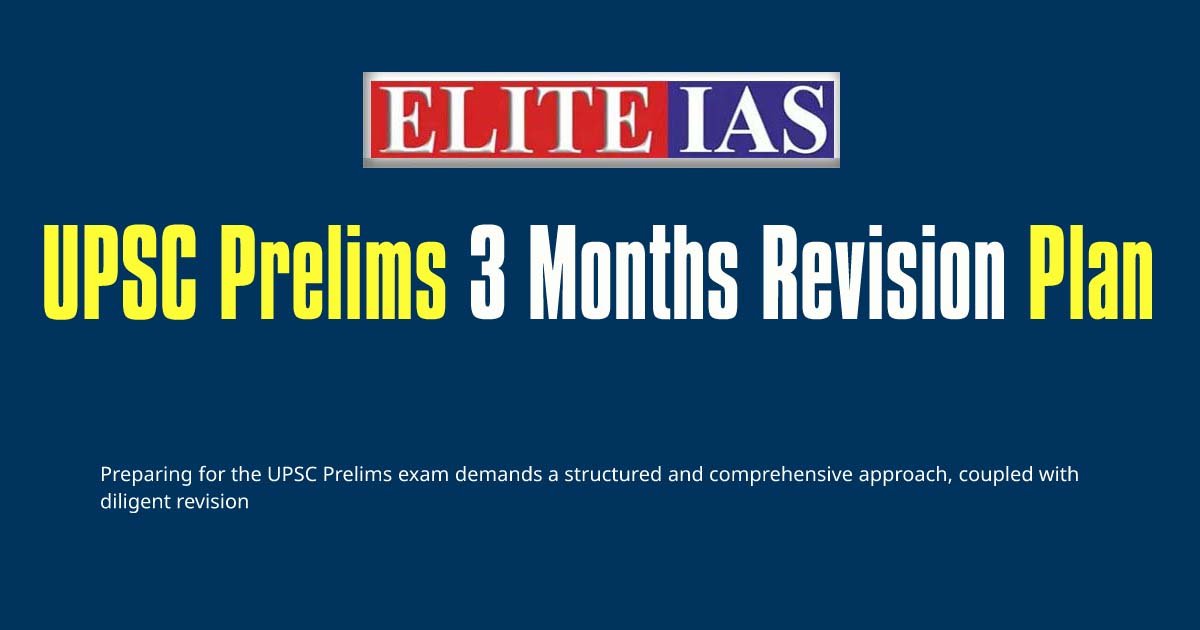
UPSC Prelims: Civil service exams administered by the Union Public Service Commission (UPSC) are your ticket to the most coveted government jobs, such as the Indian Administrative Service (IAS), Indian Foreign Service (IFS), and Indian Police Service (IPS). It’s no surprise, however, that these extremely competitive tests, in which lakhs of hopefuls compete for a small number of posts, are difficult to crack.
Preparing for the civil services exam is a lengthy process. The preliminary stage is just the beginning of the numerous battles to come. To assure success over the next three months, maintain a laser-like focus. With less than three months until the preliminary examination, the UPSC candidates are in a critical stage.
Though passing the UPSC Prelims on the first try is difficult, solid planning and developing a well-rounded preparation approach over the last few months will ensure success. A good plan during this time can help you get through the first stage of the screening process and onto the next level, the major examination. I’ll share with you the plan that nearly all best IAS coaching of Delhi prescribe to their students.
UPSC Prelims Exam Pattern
The UPSC Prelims exam has two objective type examinations, General Studies I and General Studies II or CSAT, with a total of 400 points. Both papers were presented in two sessions on the same day, using the offline approach. The UPSC Prelims Exam Admit Card will be available on the UPSC official website two or three weeks prior to the examination day.
Check UPSC Prelims Examination Syllabus
General Studies Paper-1 Syllabus:
- Current events of national and international importance.
- History of India and Indian National Movement.
- Indian and World Geography-Physical, Social, Economic Geography of India and the World.
- Indian Polity and Governance – Constitution, Political System, Panchayati Raj, Public Policy, Rights Issues, etc.
- Economic and Social Development – Sustainable Development, Poverty, Inclusion, Demographics, Social Sector initiatives, etc.
- issues on Environmental Ecology, Biodiversity and Climate Change- that do not require subject specialization.
- General Science.
General Studies Paper-2 (CSAT) Syllabus:
- Comprehension.
- Interpersonal skills including communication skills;
- Logical reasoning and analytical ability.
- Decision-making and problem-solving.
- General mental ability.
- Basic numeracy (numbers and their relations, orders of magnitude, etc.) (Class X level)
- Data interpretation (charts, graphs, tables, data sufficiency, etc. – Class X level).
- English language comprehension skills – Class X level.
Need of a 3-Months Timetable
- A timetable is essential for your preparation. This will assist you in appropriately allocating your time among numerous topics.
- A plan will provide you with a clear direction on how to prepare for the UPSC.
- Furthermore, with only three months to work with, you must effectively allocate your time. You must create a schedule that is tailored to your needs.
- Allocate the remaining days to various subjects, based on their importance in the examination and your level of preparation for each.
- The first month of this period should be spent reviewing the fundamentals of any subject you have not yet covered. Examine the UPSC preliminary exam syllabus carefully for any topics that you may have overlooked.
- Read summary notes made by previous successful candidates or a reputable coaching institute or publisher for the topics that you believe are lengthy.
- Within these two months, you should have finished your first reading of the syllabus.
- This is critical at this point in the planning process. Allocate time to each topic or subject based on their importance or weightage while creating a schedule for these last three months.
3 Months-Breakup
| Art and culture | 5 days |
| Science and Technology | 10 days |
| Polity | 15 days |
| Geography | 15 days |
| History | 15 days |
| Environment And Ecology | 10 days |
| Economy | 10 days |
| CSAT | 10 days |
| Current Affairs | Daily |
3 Months revision plan for UPSC Prelims 2024:
Examine the Syllabus in Depth
- Now take a close look at the syllabus. This will ensure that you do not miss any topics. Prepare for any topics you may have missed. Make a point of reading the syllabus three times. You will always be able to find a new topic to research.
Make revisions based on your notes.
- Keep your subject-specific notes on hand and go through them as you revise. This will save you a lot of time because you won’t have to go over each issue in detail.
- If you haven’t made separate notes yet, some coaching centres will release subject-specific revision notes two months before the exam. They can be found both online and in the form of printed publications.
Current Affairs
- This is the most important section of the UPSC Prelims examination. You should be familiar with its background and theories.
- Current events are interwoven in many disciplines like as Science & Technology, Economy, Polity & Governance, and so on, according to recent UPSC trends. On the other hand, history and geography are both static.
- You must be up to date on current events for at least 18 months. For the Prelims exam this year.
- The easiest method to keep up with current events is to read the newspaper every day. Always conduct extensive research on any topic that is constantly in the news.
Keep Resources limited.
- From now on, keep your resources to a minimum. In general, new reference books or other sources should be avoided during this time, especially in the final month of preparation.
- Adding any additional sources at this point will most certainly cause tension and prevent you from revising what you’ve already learned.
Focus on Revisions
- Re-read the necessary NCERTs. The NCERTs provide a wealth of knowledge for the UPSC civil services preliminary examination. A short review of the key NCERT texts in history, politics, geography, and macroeconomics is especially important.
- Examine your own notes, subject by subject. During these three months, revise their work at least two to three times. Highlight the difficult-to-remember, key topics while studying your own notes.
- The highlighted points might then be reviewed again immediately before the exam, say in the final week of study. It is also recommended that a revision document be created for the last days of revision. As a result, candidates should reduce their notes for the final days of preparation.
Attempt Practice Exams
- Take as many quality practises tests as possible. At the very least, take two to three practise tests till the end of May. Candidates are encouraged to take at least one practise test per day after that.
- Crossing the projected cut off in most, if not all, practise examinations is an important goal. This will increase one’s self-assurance before to the exam.
- Avoid the trap of tackling a single question and then seeking up the answer in the literature while taking the practise tests. You might be able to locate the answer this way. However, you will be unable to devise a test plan.
- Instead, complete a full practise exam within the allotted time. After you’ve finished it, look up the answers to all of the questions and assess your performance.
Focus on CSAT
- Most candidates discount the value of the aptitude test because it is a qualification test.
- Furthermore, the qualifying marks are established at a low level of 33%. Candidates can next concentrate on the more difficult general studies paper 1, which sets the cut-off marks based on their relative performance.
- However, completely disregarding CSAT preparation is not a good idea.
- Candidates should at the very least attempt some CSAT question papers from prior years to familiarise themselves with the format.
Develop A Test Strategy
- Aspirants are recommended to establish a test strategy when taking practise tests in a simulated setting.
- The plan must be tailored to the individual’s risk appetite and level of preparedness. In the examination, one’s strategy should allow them to take calculated risks.
- In general, a candidate should attempt 85 to 90 questions in total.
- Successful candidates often attempt at least 60 of these questions, with answers they are certain of.
- First, attempt another 25 to 30 questions, eliminating the two least likely answer options. Then, based on the remaining two, make an educated guess.
Take care of Your Health
- In the last three months, a candidate is likely to have spent 8 to 10 hours each day studying.
- It is also critical to obtain enough sleep, consume a nutritious diet, and exercise on a daily basis. To tackle the challenge of the preliminary exam front on, good physical and mental health is required.
Topic-wise suggestions
Follow these subject tips for the revision of UPSC Prelims 2024.
- History: Focus on art and culture, modern history, ancient history and medieval history in that order.
- Polity & Governance: Pay special attention to what is happening in the current scenario. Examples include Right to Privacy, Right to Freedom of Expression, Citizenship Act, Directive Principles of State Policy and Farm Laws among others.
- Science & Technology: Focus should be on space, defence, biotechnology, new diseases and other latest developments.
- Geography & Environment: Pay attention to biodiversity, climate change and global warming, endangered species, animals conserved through national parks and their locations.
- Economy: Refer to Economic Survey, published by the Government of India. The main areas of focus should include Macro Economics (not Micro Economics), economic performance in various sectors, trends and analysis. Do not pay much attention to static facts and figures.
4





